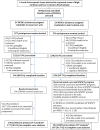Gender-informed, psychoeducational programme for couples to prevent postnatal common mental disorders among primiparous women: cluster randomised controlled trial
- PMID: 26951210
- PMCID: PMC4785308
- DOI: 10.1136/bmjopen-2015-009396
Gender-informed, psychoeducational programme for couples to prevent postnatal common mental disorders among primiparous women: cluster randomised controlled trial
Abstract
Objectives: Interventions to prevent postpartum common mental disorders (PCMD) among unselected populations of women have had limited success. The aim was to determine whether What Were We Thinking (WWWT) a gender-informed, psychoeducational programme for couples and babies can prevent PCMD among primiparous women 6 months postpartum.
Design: Cluster-randomised controlled trial.
Setting: 48 Maternal and Child Health Centres (MCHCs) from 6 Local Government Areas in Melbourne, Australia were allocated randomly to usual care (24) or usual care plus WWWT (24).
Participants: English-speaking primiparous women receiving primary care at trial MCHCs were recruited to the intervention (204) and control (196) conditions. Of these, 187 (91.7%) and 177 (90.3%) provided complete data.
Intervention: WWWT is a manualised programme comprising primary care from a trained nurse, print materials and a face-to-face seminar.
Main outcome measures: Data sources were standardised and study-specific measures collected in blinded computer-assisted telephone interviews at 6 and 26 weeks postpartum. The primary outcome was PCMD assessed by Composite International Diagnostic Interviews and Patient Health Questionnaire (PHQ) Depression and Generalised Anxiety Disorder modules.
Results: In intention-to-treat analyses the adjusted OR (AOR) of PCMD in the intervention compared to the usual care group was 0.78 (95% CI 0.38 to 1.63, ns), but mild to moderate anxiety symptoms (AOR 0.58, 95% CI 0.35 to 0.97) and poor self-rated health (AOR 0.46, 95% CI 0.22 to 0.97) were significantly lower. In a per protocol analysis, comparing the full (three component) intervention and usual care groups, the AOR of PCMD was 0.36, (95% CI 0.14 to 0.95). The WWWT seminar was appraised as salient, comprehensible and useful by >85% participants. No harms were detected.
Conclusions: WWWT is readily integrated into primary care, enables inclusion of fathers and addresses modifiable risks for PCMD directly. The full intervention appears a promising programme for preventing PCMD, optimising family functioning, and as the first component of a stepped approach to mental healthcare.
Trial registration number: ACTRN12613000506796; Results.
Keywords: PRIMARY CARE; father-inclusive; postnatal common mental disorders; prevention; psychoeducation.
Published by the BMJ Publishing Group Limited. For permission to use (where not already granted under a licence) please go to http://www.bmj.com/company/products-services/rights-and-licensing/
Figures
Similar articles
-
Gender-informed psycho-educational programme to promote respectful relationships and reduce postpartum common mental disorders among primiparous women: long-term follow-up of participants in a community-based cluster randomised controlled trial.Glob Ment Health (Camb). 2018 Sep 25;5:e30. doi: 10.1017/gmh.2018.20. eCollection 2018. Glob Ment Health (Camb). 2018. PMID: 30455965 Free PMC article.
-
A cluster randomised controlled trial of a brief couple-focused psychoeducational intervention to prevent common postnatal mental disorders among women: study protocol.BMJ Open. 2014 Sep 23;4(9):e006436. doi: 10.1136/bmjopen-2014-006436. BMJ Open. 2014. PMID: 25248497 Free PMC article. Clinical Trial.
-
Preventing postnatal maternal mental health problems using a psychoeducational intervention: the cost-effectiveness of What Were We Thinking.BMJ Open. 2016 Nov 18;6(11):e012086. doi: 10.1136/bmjopen-2016-012086. BMJ Open. 2016. PMID: 27864246 Free PMC article. Clinical Trial.
-
Innovative psycho-educational program to prevent common postpartum mental disorders in primiparous women: a before and after controlled study.BMC Public Health. 2010 Jul 23;10:432. doi: 10.1186/1471-2458-10-432. BMC Public Health. 2010. PMID: 20653934 Free PMC article.
-
Development of a universal psycho-educational intervention to prevent common postpartum mental disorders in primiparous women: a multiple method approach.BMC Public Health. 2010 Aug 18;10:499. doi: 10.1186/1471-2458-10-499. BMC Public Health. 2010. PMID: 20718991 Free PMC article.
Cited by
-
Parental and health professional evaluations of a support service for parents of excessively crying infants.BMC Health Serv Res. 2019 Aug 22;19(1):592. doi: 10.1186/s12913-019-4430-5. BMC Health Serv Res. 2019. PMID: 31438940 Free PMC article.
-
Prevention of Mental Health Difficulties for Children Aged 0-3 Years: A Review.Front Psychol. 2021 Sep 29;11:500361. doi: 10.3389/fpsyg.2020.500361. eCollection 2020. Front Psychol. 2021. PMID: 34777074 Free PMC article. Review.
-
A Review of the Involvement of Partners and Family Members in Psychosocial Interventions for Supporting Women at Risk of or Experiencing Perinatal Depression and Anxiety.Int J Environ Res Public Health. 2021 May 18;18(10):5396. doi: 10.3390/ijerph18105396. Int J Environ Res Public Health. 2021. PMID: 34070148 Free PMC article. Review.
-
Gender competence and mental health promotion.World Psychiatry. 2020 Feb;19(1):34-35. doi: 10.1002/wps.20694. World Psychiatry. 2020. PMID: 31922677 Free PMC article. No abstract available.
-
Screening for perinatal depression with the Patient Health Questionnaire depression scale (PHQ-9): A systematic review and meta-analysis.Gen Hosp Psychiatry. 2021 Jan-Feb;68:74-82. doi: 10.1016/j.genhosppsych.2020.12.007. Epub 2020 Dec 21. Gen Hosp Psychiatry. 2021. PMID: 33360526 Free PMC article.
References
-
- Goldberg DP, Huxley P. Common mental disorders: a bio-social model. New York: Tavistock / Routledge, 1992.
-
- Mrazek P, Haggerty R. Reducing risks for mental disorders: frontiers for preventive intervention research. Washington DC: National Academy Press, 1994. - PubMed
-
- Dennis C, Dowswell T. Psychosocial and psychological interventions for preventing postpartum depression (Review). In: The Cochrane Library. Issue 2, 2013.
-
- Priest SR, Henderson J, Evans SF et al. . Stress debriefing after childbirth: a randomised controlled trial. Med J Aust 2003;178:542–5. - PubMed
Publication types
MeSH terms
Associated data
LinkOut - more resources
Full Text Sources
Other Literature Sources
Medical
Miscellaneous

